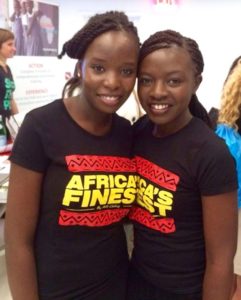
Lavender and Lydiah
Lydiah Mpyisi, ’16, and Lavender Micalo, ’18, are both students who were both brought up in Nairobi, Kenya where they witnessed first-hand many issues large cities can have such as overpopulation, insecurity and unemployment. Their experiences there helped motivate them into their current project. Lydiah and Lavender’s project was also inspired from Dr. Okeef and Dr. Bucher’s classes. Their project is titled “Greening Urban Slums and Promoting Community Health through Secondary Healthcare Interventions”.
After starting their project, Lydiah and Lavender attended the 7th Annual Millennial Campus Network Conference at the United Nations Headquarters in New York City in August 2015. At the conference, the two learned about the Wege Prize 2016 Competition, a yearly competition where undergraduate students design and propose a product, service, business/non-profit organization, or other solution to solve a problem that can help us transition from a linear economic model to a circular economic model.
Afterwards, Lydiah and Lavender formed Team KYCE (Kenyan Youths for Circular Economy) with students from three other colleges and entered the Wege Prize 2016 competition. Their plan for the project is to use already existing independent projects and integrate them in way that will create a self-sustaining system that will create employment, improve sanitation and hygiene, enhance the aesthetic value of the urban slums, and improve the overall health of the slum communities.
Team KYCE integrates four projects: The Community Cooker, Peepoo, Community Gardens, and Bio digesters. The Community Cooker uses trash, collected by local youth for income, to power a neighborhood cooking facility. Peepoo is a personal toilet that is used to convert human waste into organic fertilizer. Community gardens are pieces of land gardened by a group of people and are used to produce fruits, vegetables, and/or ornamentals. And lastly, Bio-digesters are structures in which organic matter is digested through anaerobic fermentation with the production of a burnable biogas and a nutrient-rich slurry.
“KYCE will work with the locals to set up waste collection and sorting sites. The waste will be sorted out into categories: biodegradable, recyclable, reusable, and combustible. The biodegradable waste will be used a raw material for a bio-digester that will be set up to generate liquid ethanol and biogas that can be used as a source of electricity to the roadside business owners during night hours to curb insecurity. The recyclable wastes will be sold to recycling companies and converted into useful materials that can be resold. The money obtained from the recycling companies will be used to pay the worker at the waste collection site. Wastes that can be re-used will be donated to orphanages or to other members of the slum communities who may be in need of those items. The combustible waste will be sold to the Community Cooker management crew to be used as a source of fuel for the Community Cooker. The payment from this transaction can be used to fuel the trucks used to transport the wastes to the collection sites. With this approach of waste management, we envision that we will be able to re-duce trash and dumpsites that are found in public places in most urban slums in developing countries. Additionally, we plan to work together with the locals to establish urban and/or community gardens to replace the dump sites. The garden will be used to grow food crops, which will not only provide food but will also provide a source of income to those who will be involved in planting and selling the food. To enhance the growth of food, KYCE will partner with Peepoople to obtain the organic fertilizer that Peepoo makes from human waste. Continued use of Peepoo will help to minimize the use of ‘flying toilets’ and defecating in public places. As a result, there will be improved sanitation in the urban slums.”
KYCE was named one of the five finalists in the Wege Prize competition and students will be travelling to Michigan in May to present their project to a panel of judges for the chance to win.
“Our hope is that our project will be chosen as the best. We are currently working on refining the details of the project and the presentation slides. We are happy that we got this opportunity to represent the good work that Roanoke College students, like us, are doing to impact communities in a positive way.”